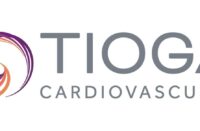New health economics research on polygenic risk score (PRS) for cardiovascular disease published in the Journal of the American Heart Association highlights the cost savings of PRS testing for US healthcare systems
NEW YORK, July 7, 2022 /PRNewswire/ — Allelica, a leading genomic software company specializing in secure and scalable solutions to implement clinical-grade PRS, has published a health economics study in the Journal of the American Heart Association. The study’s authors concluded that integrating PRS as an additional risk-enhancing factor in the Pooled Cohort Equation (PCE) risk assessment (the standard of care for determining the risk of atherosclerotic cardiovascular disease) is cost-saving for US healthcare systems.
The study, ‘Integrating a Polygenic Risk Score for Coronary Artery Disease as a Risk‐Enhancing Factor in the Pooled Cohort Equation: A Cost‐Effectiveness Analysis Study,’ also showed that PRS was cost-saving across all age groups, with more health and economic benefits realized in younger populations when followed over a lifetime. This result indicates that genetic testing is highly beneficial when implemented early in the preventive-care pathway.
“We know that PRS can identify high-risk individuals who are invisible to traditional risk assessments for cardiovascular disease, so the question became: is it sustainable from an implementation perspective?” said Giordano Bottà, CEO and co-founder of Allelica. “The results of this study showed us that adding PRS to the standard of care not only improves individual health outcomes; it saves money. These results demonstrate that using the genetic risk factor in preventive care has a tremendous impact in reducing healthcare costs, allowing for better allocation of resources to lessen the burden of cardiovascular diseases on our society.”
The results also showed that in a cohort of 10,000 individuals with borderline risk of cardiovascular disease and not taking statin therapy, the integration of PRS in the PCE would prevent 29 additional events of CAD and ischemic stroke, with an average cost savings of $40 per person screened over a five‐year time horizon — equivalent to a healthcare cost savings of $1.6 billion.
Allelica health economist Dr. Deo Mujwara led the study, in collaboration with experts from both industry and academia at Illumina Inc. and the University of Sydney. Dr. Mujwara commented: “This analysis provides the needed evidence for payers and policy makers to consider integrating PRS in the standard of care as an additional tool in cardiovascular disease prevention.”
The authors applied a Markov model on a cohort of 40‐year‐old individuals with borderline or intermediate 10‐year risk (5% to <20%) for atherosclerotic cardiovascular disease to identify those in the top quintile of the CAD‐PRS distribution who are at high risk and eligible for statin prevention therapy. The model projected medical costs (2019 $US) of screening for CAD, statin prevention therapy, treatment, and monitoring patients living with CAD or ischemic stroke and quality‐adjusted life‐years for PCE+CAD‐PRS versus PCE alone. The risk of developing CAD, the effectiveness of statin prevention therapy, and the cost of treating CAD had the largest impact on the cost per quality‐adjusted life‐year gained.
The analysis published in JAHA assessed the real-world cost-effectiveness of prior research published by Aragam et al. in the Journal of the American College of Cardiology in 2020. In that study, the authors described the clinical scope of using PRS as a risk-enhancing factor and found that four percent of the primary population who should be taking statin therapy is unidentified by risk assessments that do not include PRS.
The results of the cost-effectiveness study (Mujwara et al. 2022) lay the foundation for the reimbursement process of PRS testing in US healthcare systems. Allelica’s previously published work in Circulation, ‘Risk of Coronary Artery Disease Conferred by Low-Density Lipoprotein Cholesterol Depends on Polygenic Background,’ showed that combining information on an individual’s polygenic risk of heart attack with their LDL level helps determine those at most risk from heart attack, including those potentially in need of treatment with statins or PCSK9 inhibitors.
Clinical-grade PRS testing for coronary artery disease is currently available as a laboratory-developed test (LDT) offered by Allelica and performed in collaboration with CLIA CAP Eurofins lab, Clinical Enterprise, in Massachusetts. Earlier this year, Allelica launched clinical-grade PRS testing services for a range of other diseases, including breast cancer, prostate cancer, and Type 2 Diabetes. The tests are available through physician’s order.
A PRS is a measurement of a person’s risk of disease that results from the combined effect of many DNA variants across the genome, and is calculated by combining the effect of these variants, each contributing a small increase or decrease in risk into an overall risk score. This information can be used to stratify individuals based on their risk of disease. By combining PRS with conventional risk factors, Allelica aims to make precision medicine available at scale.
Allelica is a leading genomic software company that specializes in secure and scalable solutions to implement clinical-grade polygenic risk scores (PRSs). Allelica’s technology combines world-class datasets with the most advanced algorithms to build PRSs with the highest predictive power for estimating disease risk. Allelica’s tools translate the enormous potential of genomic data into practical tools that can be used to identify individuals with a high genetic susceptibility for life-threatening diseases. Through the incorporation of genetics into disease risk assessments, Allelica is helping to build the foundations of preventive medicine by helping to identify those for whom early intervention and behavior modification could help reduce lifetime risk. To learn more, visit allelica.com.
SOURCE Allelica, Inc.




